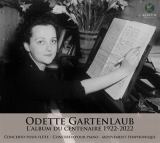Die französische Komponistin Odette Gartenlaub (1922-2014) studierte u.a. Klavier bei Marguerite Long und Yves Nat sowie Komposition bei Olivier Messiaen, Henri Busser und Darius Milhaud. 1948 gewann sie den Premier Grand Prix de Rome. Nach ihrer Rückkehr von dem mit diesem Preis verbundenen dreijährigen Aufenthalt in der Villa Medici in Rom begann Gartenlaub eine Laufbahn als Pianistin, Komponistin und Pädagogin. Den Krieg überstand sie trotz ihrer jüdischen Wurzeln einigermaßen gut.
Die kämpferische Musikerin, die nach der Befreiung von Paris eingekerkert wurde, weil sie mit Freunden ein Konzert des Kollaborateurs Adolphe Boschot sabotiert hatte, Messiaen die kalte Schulter zeigte und sich Milhaud zuwandte, ist dafür bekannt, den Musikunterricht am Konservatorium in Paris revolutioniert zu haben. In ihrem kompositorischen Schaffen ist sie stilistisch nicht wirklich festzulegen, denn sie benutzt einen freien Kompositionsstil, in dem rhythmische Prägnanz ein wichtiges Merkmal ist.
Auf dieser CD erklingt zunächst das Flötenkonzert von 1955, ein für den Solisten technisch anspruchsvolles Werk, in dem die Flöte durchgehend eine sehr prominente Rolle spielt. Raymond Guiot liefert vom Solopart eine beeindruckende Interpretation.
Nach dem Concertino von 1952 ist das Klavierkonzert von 1958 das zweite in dieser Gattung. Gartenlaub spielte selber den Solopart bei der Uraufführung unter Désiré Inghelbrecht. Und es ist die Aufnahme dieser Uraufführung, die auf dieser CD zu hören ist. Ein rhythmisches Allegro vivo führt zu einem mysteriös rhythmischen Andante, ehe ein Marcato giocoso, in dem das Schlagwerk eine wichtige Rolle spielt, das Konzert beendet.
Inghelbrecht dirigierte auch die Uraufführung des Mouvement Symphonique, deren Mitschnitt vom 17. Juli 1955 auf dieser CD zu hören ist. Das Werk beginnt sehr schwermütig und eskaliert danach mit rhythmischer Dramatik, ohne seinen bedrückten Charakter aufzugeben.
French composer Odette Gartenlaub (1922-2014) studied piano with Marguerite Long and Yves Nat, and composition with Olivier Messiaen, Henri Busser, and Darius Milhaud. In 1948, she won the Premier Grand Prix de Rome. Upon her return from the three-year stay at the Villa Medici in Rome associated with this prize, Gartenlaub began a career as a pianist, composer, and teacher. She survived the war reasonably well despite her Jewish roots.
A combative musician, she was imprisoned after the liberation of Paris for sabotaging together with some friends a concert by collaborator Adolphe Boschot, she cold-shouldered Messiaen and turned to Milhaud, and she is credited with revolutionizing the teaching of music at the Paris Conservatory. In her compositional output, she cannot really be pinned down stylistically, using a free style of composition in which the rhythmic element is an important feature.
This CD first features the Flute Concerto from 1955, a technically demanding work for the soloist in which the flute plays a very prominent role throughout. Raymond Guiot delivers an impressive interpretation of the solo part.
After the Concertino of 1952, the Piano Concerto of 1958 is the second in this genre. Gartenlaub himself played the solo part at the premiere under Désiré Inghelbrecht. And it is the recording of that premiere that is heard on this CD. A rhythmic allegro vivo leads to a mysteriously rhythmic andante before a marcato giocoso, in which percussion plays an important role, ends the concerto.
Inghelbrecht also conducted the premiere of the Mouvement Symphonique, a recording from July 17, 1955. The work begins very melancholy and then escalates with rhythmic drama without abandoning its depressed character.
























